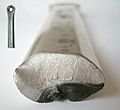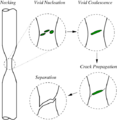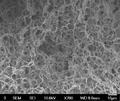Fracture facts for kids
A fracture happens when something breaks or cracks. It's a common word used in many different ways. For example, a fracture can be a broken bone, a crack in a rock, or even when a material like metal or glass breaks apart. It means there's a split or a break in something that was once whole.
Contents
What is a Fracture?
A fracture is basically a break. It can happen to many different things. Think about a twig snapping in half, a glass falling and breaking, or a crack forming in a sidewalk. All these are examples of fractures. Scientists and engineers study fractures to understand why things break and how to make them stronger.
Types of Fractures
Fractures can be described in different ways, depending on what is breaking and how it breaks.
Material Fracture
When we talk about material fracture, we mean when any material, like metal, plastic, or wood, breaks. This can happen if you pull on it too hard, bend it too much, or hit it with a lot of force. Materials can break in different ways.
- Ductile fracture happens when a material stretches and deforms a lot before it finally breaks. Imagine stretching a piece of chewing gum until it snaps. Metals like copper often show ductile fracture.
- Brittle fracture happens when a material breaks suddenly without much stretching or bending. Think of a glass breaking when it falls. It just shatters. Ceramics and some types of steel can show brittle fracture.
Geological Fracture
In geology, a fracture refers to a break or crack in rocks. These are often called faults or joints. The Earth's crust is made of huge plates that are always moving. When these plates push or pull against each other, the rocks can crack and break.
- Faults are fractures where the rocks on either side have moved past each other. This movement can cause earthquakes.
- Joints are fractures where the rocks have not moved. They are just cracks.
Mineral Fracture
When minerals break, it's called mineral fracture. Minerals are natural solids with a specific crystal structure. How they break can tell us a lot about them.
- Some minerals break along flat, smooth surfaces. This is called cleavage.
- Other minerals break along uneven, rough surfaces. This is called fracture. For example, quartz often shows a curved, shell-like fracture called conchoidal fracture.
Bone Fracture
Perhaps the most common type of fracture people think of is a bone fracture. This is when a bone in your body breaks or cracks. Bones are strong, but they can break if too much force is put on them.
- Bone fractures can happen from falls, sports injuries, or accidents.
- There are different types of bone fractures, like a clean break, a hairline crack, or a break where the bone shatters into many pieces.
- Doctors use X-rays to see bone fractures.
- Broken bones usually heal over time with proper care, often involving a cast to keep the bone still.
Images for kids
See also
 In Spanish: Fractura para niños
In Spanish: Fractura para niños
 | Charles R. Drew |
 | Benjamin Banneker |
 | Jane C. Wright |
 | Roger Arliner Young |






